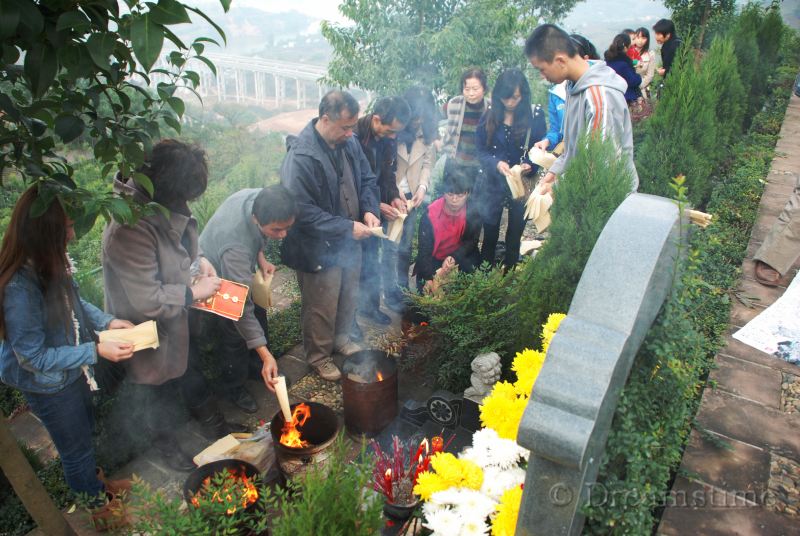Ancestor veneration in China
What has often been translated as ‘ancestor worship’ may be more helpfully be called ‘veneration’. The use of the word ‘worship’ immediately makes it sound more religious than it actually is. The belief is not associated with any particular Chinese religion, indeed it has remained the unchanging bedrock of Chinese tradition before the major religions emerged. Veneration of ancestors can be traced back to the rituals carried out by the dynastic rulers as far back as the Shang dynasty 3,500 years ago. Ancient Shang tombs have been found with ceramic vessels of food left for the dead. The ancient characters found on Shang ‘oracle bones’ confirm the widespread rituals associated with the ancestors. The Chinese classic, the ‘Book of Songs’ describes elaborate and emotional rituals dating from the following Zhou dynasty. The ancient belief is that people have two spirits: the 魄 pò provides a person’s physical body and the 魂 hún is the personality and the immortal soul; both aspects have to be correctly handled after death. The hun is destroyed by cremation and that is why bodies were for centuries buried and not burned. Other spirits are the 神 shén which are helpful (ancestors of the male line) and the evil spirits 鬼 guǐ which are often malevolent. The Chinese underworld is called the 黄泉 huáng quán 'Yellow Springs ➚' and was established as early as the 8th century BCE, this was where everyone's spirit (魄 pò) ended up and is neither heaven or hell. When Buddhism became established in the Tang dynasty the complex series of levels of hell became a widespread belief, ruled over by King Yama 阎王 Yán wáng. The Buddhist hell is more like Christian purgatory as souls are punished but not indefinitely.
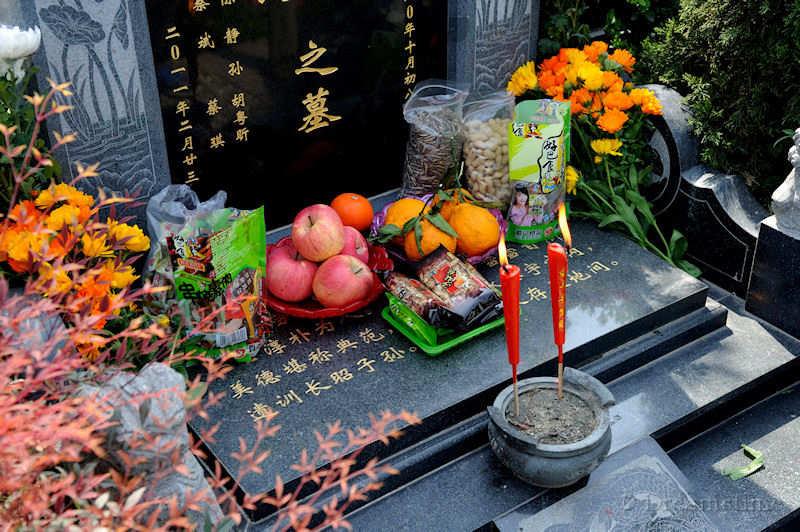
After-life
Ancestor veneration is based on a long held belief that the ancestral spirits are watching over the lives of their living descendents from the after-life; and so the ancestors are informed of all important events in the family, especially marriages. The souls of the departed are believed to have the power to bring retribution upon the living, and so the appropriate offerings must be provided to keep them content. Only men could perform the rites and this was one reason why a higher value placed on sons rather than daughters. Without a son there was no-one to venerate the ancestors and their spirits would then bring misfortune on the remaining family. The duty went both ways, if ancestors had failed in their duty to their descendents during their lives, by for instance not maintaining the land, they could be removed from the shrine and deleted from the official family tree.
It was considered a part of family loyalty where people venerated their parents and grandparents. The connection to ancestors and the amount of ceremony decreased through five generations. Immediate ancestors would receive gifts tailored to their personality in life, distant ancestors just a generic offering.
Funerals
Chinese funerals used to be very grand affairs, the number of mourners was considered an indication of prestige and typically hundreds would attend. In the case of national leaders, a funeral procession measuring miles in length was not untypical. It would be a led by a man carrying posters proclaiming the achievements of the deceased. Jugglers, musicians and acrobats would enliven the parade. Most people belonging to a number of organizations whose sole function was to attend and pay for funerals. As part of the ceremony paper sculptures of everyday items would be burned so that they joined the deceased in the after-life.
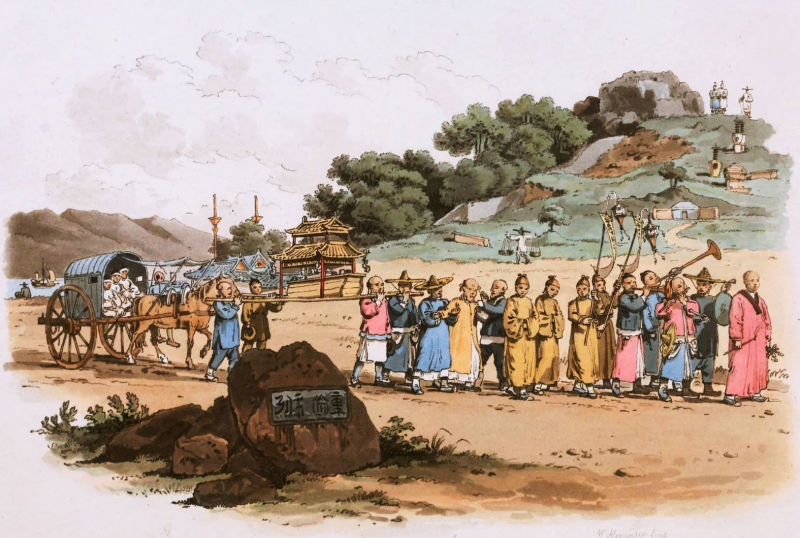
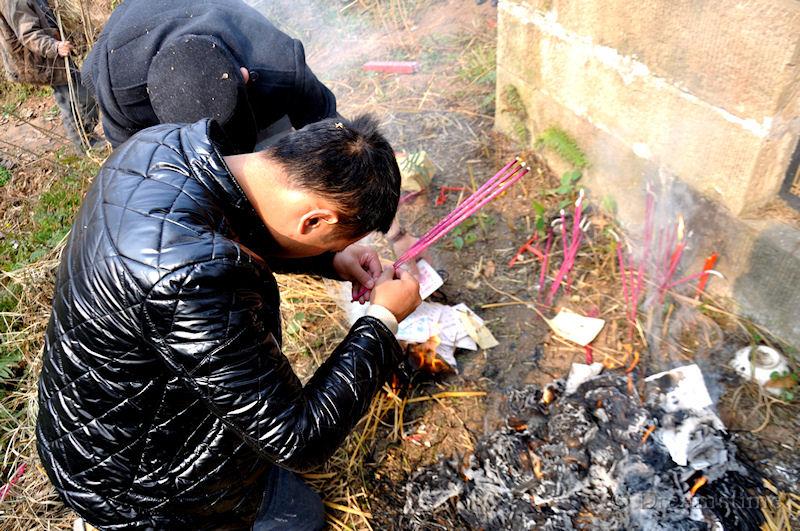
After the death of a parent the Book of Rites was followed by many people. Children were expected to formally mourn for three years and not work for this whole period; frequently contemplating how to continue the parent's mission in life. If the Emperor died all marriages would have to be delayed for a whole year.
At least twice a year the family would visit the ancestral graveyard, burn incense sticks and leave food and presents. Often the family would have an ancestral hall that has tablets listing all members of the extended clan or family. The ancestral hall was often grander than ordinary houses with a large main hall. Very few of these halls now remain, as they were victims of Mao's cultural revolution to remove old customs and traditions. Often a parcel of 'ancestral' land generated income that was used to pay for the maintenance of the shrine and the offerings. For many people long ago, all the villagers were related and bore the same surname. The veneration of ancestors was then a communal act of solidarity and confirmation of shared heritage. Key family events including weddings, birthdays as well as funerals were led by the clan elders who passed on family traditions and made the key decisions for the family. The most important times to visit the graveyard are at Qingming festival in April and then Hungry Ghost Day in August. At Chinese New Year many Chinese people travel back to their ancestral home village which has the burial ground of the ancestors. The tradition of ancestor veneration remains strong in rural areas, much less so in cities.
The ancestral graveyard would normally be located on high ground outside the town or village. The burial ground was treated with great respect, any damage or theft was severely punished, sometimes the death penalty would be applied in such cases. The revered pine or cypress trees often planted in or around them could never be cut down, they had to be left to die naturally.
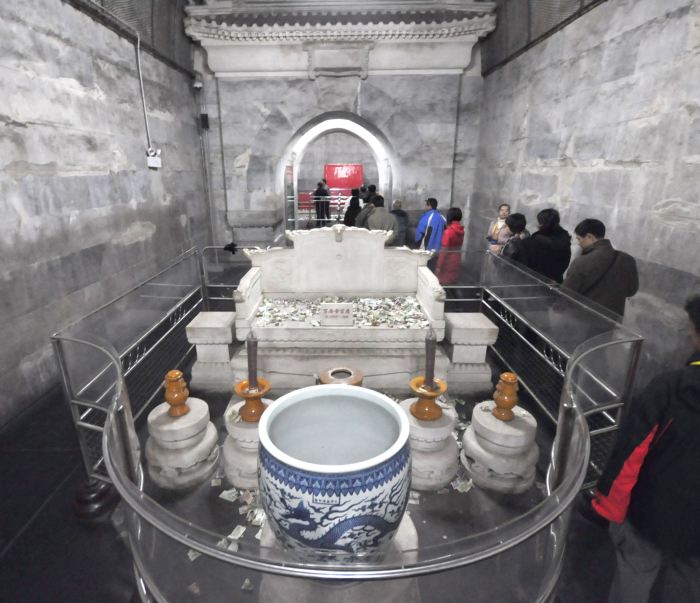
As is most Chinese traditions it was the Emperor who led the veneration. The graveyards of the Imperial families were as lavish in scale and expense as any palaces for the living. The largest and best known tomb complex is the Ming Tombs near Beijing. Here the Emperor (and this continued until 1922) would visit frequently and take part in a formal ceremony to venerate all the Chinese emperors, not just his own dynasty.
Ancestral shrine
An ancestral tablet bears the names of the ancestors. Tradition has it that a part of the deceased spirit is locked in the ancestral tablet. Sometimes chicken blood was offered as sustenance to the spirit trapped inside it. Every home had a shrine dedicated to the family's ancestors and this is still fairly common nowadays. A small ancestral shrine is usually placed on the north wall of the house with incense burners around it. A mother's name is added to the inscribed list on the tablet alongside the father on her death. As it was so important to have your name inscribed on a tablet, a problem arose on the death of unmarried daughters as there was no place alongside a man on the tablet for their names to be added. Sometimes a special marriage with an unmarried deceased man was arranged so her name could be put on his family's tablet. Sometimes the dead daughter was married to a bachelor on the agreement that he would, after a brief period of mourning, marry another daughter of the same family. If these options were not possible, the unmarried daughter could pay to have her name added to a special tablet at a Buddhist temple.
Confucian ritual
Respect for ancestors is deeply enshrined in Confucian writings and the belief has its strongest roots in Confucianism. The rules of filial piety require that a son must honor and obey his father in all things even after death. Confucius had little to say about the existence of ghosts and spirits, he seemed to agree in the principle of veneration to the dead as a continuation of devotion in life. It remained as the common shared belief even if someone believed in Buddhism, Daoism, Christianity or Islam. When the Jesuits brought Christianity to China it was the strong belief in veneration that caused the most trouble as the need to honor/worship ancestors is not really compatible with Christian doctrine. The missionaries decided to try to accommodate the belief within an adapted form but the Pope in 1707 ➚ did not accept this compromise and support for Christianity became prohibited in China until modern times.
